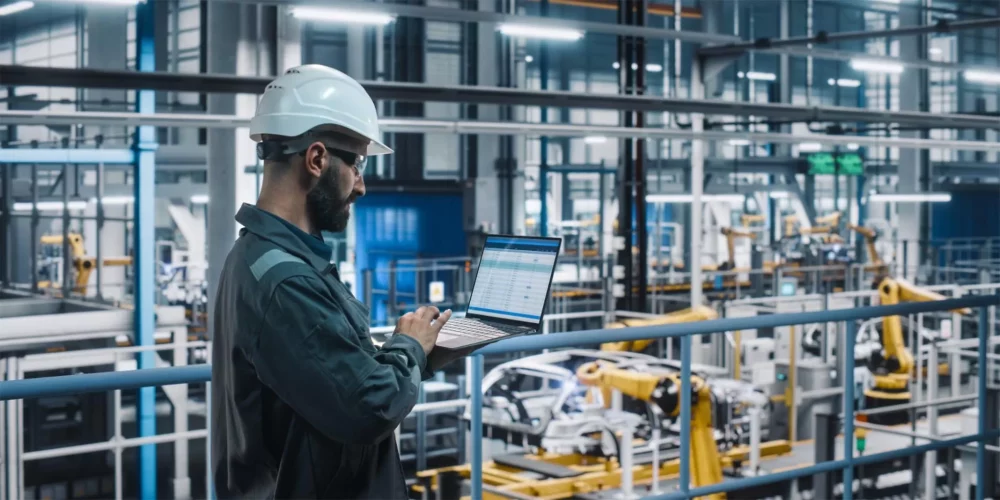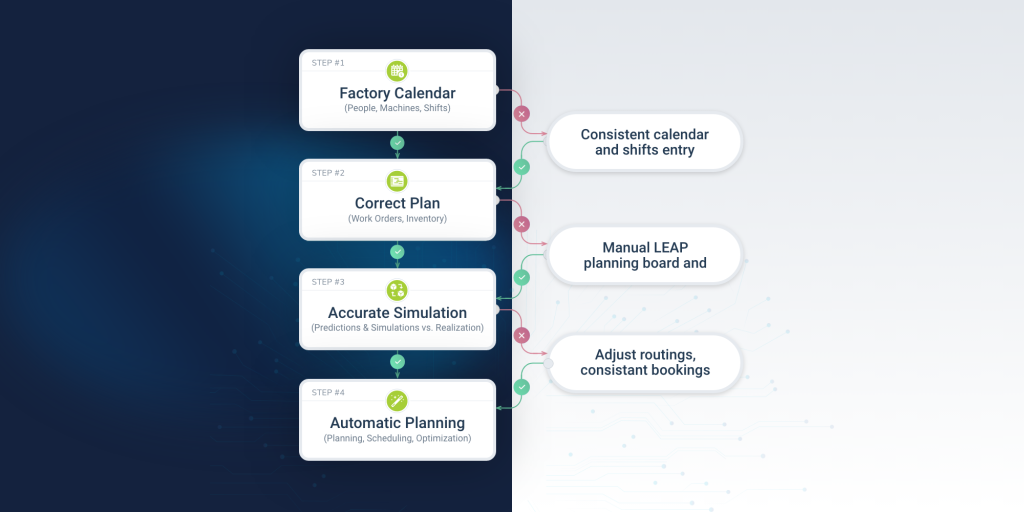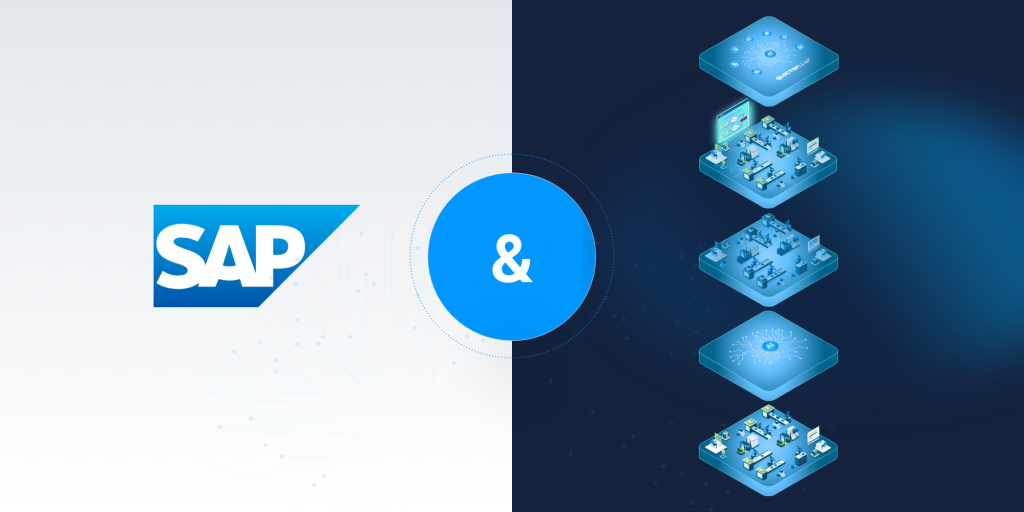The implementation of AI solutions into manufacturing plants and processes can be sold as a no-brainer, but in reality, the management, plant manager, and other production planning experts have to develop their approach to digital transformation, what problems they want to solve, how they will define their markers of success, what the desired results are, and how it will affect their organization. Even though it takes some thought and energy, it is worth it. A well carried out process of implementing an AI solution is the deciding factor that ensures a manufacturing company has what it needs most in the current times of uncertainty: predictability and transparency.
Implementing AI is a path, not a measure
In essence, AI solutions take data silos that are created through separate data generation processes, such as ERP, MES, PLC, and SCADA, and consolidate them on a time and context level. No matter which AI powered solution you decide on in the end, in order to complete the implementation process successfully, the organization will need to do its part: prepare accurate data, plan and define the necessary organizational roles and changes, change processes, and set new KPIs.
The role of the IT department changes
Every company carries its own unique set of challenges, stemming from its history, industry, processes, capacities, and workforce. QLECTOR LEAP experts are dedicated to helping and facilitating organizations through the process, guiding the company’s task force through all the necessary steps, making sure they get the most out of every stage of the process. Special attention is paid to the backbone of the digitization process: the IT department. Even though the decision for the digital transformation is made by management with a vision, it is the IT department that gains a bigger role in the organization. Best practice cases show that the success rate of the implementation project correlates to the early-stage involvement of the IT department. When they are invited to the conversation about the inception of the solution, they are able to help shape the best solution given the IT’s requirements.
Benefits of QLECTOR LEAP in numbers
The first users of QLECTOR LEAP are already measuring the benefits and improvements in their productivity and inventory capacities. The first is seen in a 50% increase in planner productivity, a 5–12% improvement in asset utilization, a 30% increase in on-time delivery to the client, 15% savings in time for logistics personnel, 1 day a week of time saved for the team coordinator, a 25% reduction in downtime, and an overall reduction in errors. Inventory management is better with a WIP reduced by 20%, a reduced inventory level by 2.5%, and a shorter time on assembly lines by 10%.
Deciding on the aim and strategy
No matter how alluring the numbers, the path of digital transformation cannot be told through benefits alone. When deciding on the solution, the organization has to analyze the issues it wants to solve, determine whether AI is the appropriate solution for them, designate the company’s implementation task force, and support and empower it through the process. The latter might be one of the most important elements. With or without digital transformation, implementing changes in an organization is difficult and takes time, but with enough patience, support, and results, even the most doubtful team members will see the benefits.
AI supporting your competitive advantage
In the current environment, a very common requirement on the part of manufacturing companies is the need to either retain or improve their flexibility. Constant changes in dates, needed tools, phases, estimates in quantities, and clients’ wishes can be hard to track and manage. The ability to have some control over and an overview of all the shifting elements is a competitive advantage. Since it enables more internal flexibility that can better respond to the changes created on the side of demand and supply, it causes less stress for the production planners, workers, and all other team members involved.
AI supporting your people
Using AI solutions, the organization can maintain and improve their flexibility, while making planning and change processes more transparent and keeping the team informed. The production planner doesn’t need to make 10 or more calls to get the materials, tools, and workforce information they need, they can simply check the planning board, review the suggested predictions, and make the necessary changes. Since AI learns from past data, it can help and suggest the most optimal solution for the given situation. No matter how good a planner is, the fact is that during a working day, most of their energy goes into solving problems. Since they have to solve as many problems as they can, they can’t waste time wondering if the solution is the most optimal, but rather that it solves the problem, at least for the time being. With the help of AI, they are able to truly select and enact the most appropriate solution. AI helps the planner respond faster, more accurately and keep all departments in the loop about the plan or change.
AI supporting your flexibility
With the implementation of an AI solution, the manufacturing site is able to have real-time accurate data and predictions on their procurement, materials, tool changes, simultaneous production of various products at the same facility, shift and workforce planning, maintenance, delivery dates, and other elements. AI solutions can help plan, predict, and guide production in the most optimal way, especially when it is subjected to many and frequent changes.
AI learns from data, “clean” data
To provide the machine learning algorithm with accurate data and in return get accurate predictions, the manufacturing company preparing for AI solution implementation has to first gather, evaluate, and clean the existing data. This requires some hard work and dedication on the part of the task force, since it requires an almost due-diligence-like review of the incoming data, evaluating its quality and accuracy. It is not uncommon that during this process, the company discovers blind spots or discrepancies in their processes. Even though it can be demanding and time-consuming, this process is very beneficial for the company since it connects processes from various departments and allows for a more birds-eye view of how the company works. In some cases, this overview is the first comprehensive run through the company’s processes since its inception, revealing where departments are connected and dependent. Since AI solutions break silos of data generated in different systems and departments, they allow the organization to have more transparency and better workflows.
Production planners and AI are partners, not competitors
Discussion about AI and the implementation of such solutions can be a delicate subject in organizations, as the workforce might fear it will make them obsolete. In reality, AI works together with the production planner, first learning from the data, establishing connections about the processes, events, and responses, and then, in the next step, helping, guiding, and responding to planning issues. AI solutions are not a replacement for the human production planner, but rather a comprehensive tool that the planner uses in order to make plans that take into account all the variables, solve problems using the best possible solution, respond quickly to crisis events, and inform all involved about the changes instantly. Since AI helps reduce errors, it helps planners work in a less stressful environment, improving their overall wellbeing. Given the workforce market realities, the AI solutions help create better working conditions for the current generation of planners, as well as help onboard new production planners quicker, and learn complex planning processes faster.
The examples of successful user implementations were gathered at one of the QLECTOR LEAP users workshops. If you are interested in implementing QLECTOR LEAP at your manufacturing site or would like to schedule a demo, you can find more information here.












